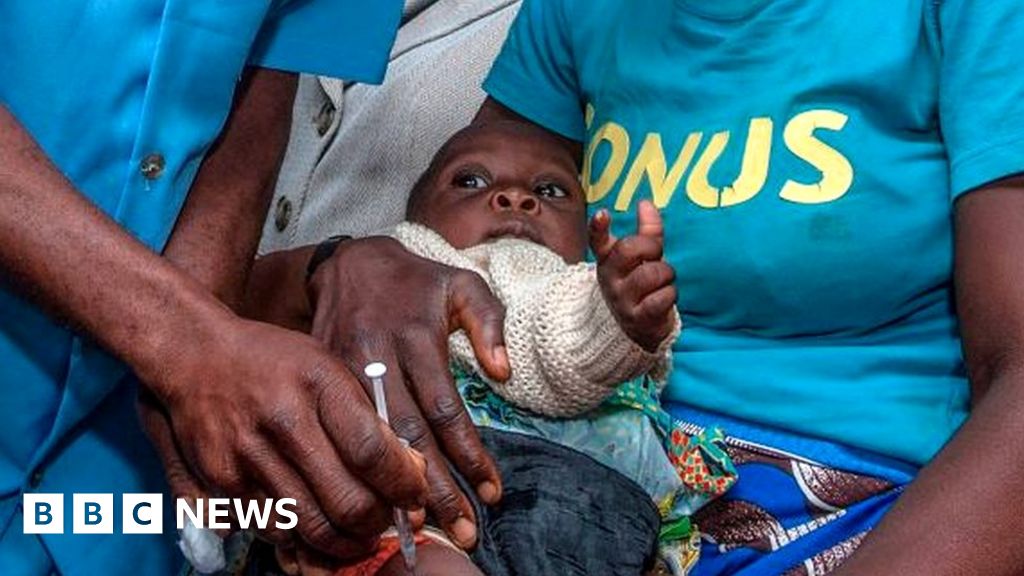
[ad_1]
With more than 260,000 children under five dying of malaria each year in sub-Saharan Africa, this development, which has been brewing for decades, could save tens of thousands of lives, according to the WHO.
But when will people start to benefit from the vaccine known as RTS, S?
We looked at this and other key issues.
How effective and safe is it?
The vaccine was shown to be effective six years ago, preventing 40% of malaria cases and 30% of severe cases.
Since 2019, researchers have been running larger pilot vaccination programs in Ghana, Kenya and Malawi.
More than 800,000 children have received at least one dose and the WHO says there are no safety concerns.
Is it important that the protection is relatively weak?
It would obviously be better if it were higher, but what many would say is think about the scale of the problem – with hundreds of millions of cases, a 40% reduction is still a huge number. lives saved.
“It’s a moderately effective vaccine … [but] saving, preserving, preventing 30-40% of cases and deaths can bring a major benefit to the population, ”WHO’s Pedro Alonso told BBC Focus on Africa.
Health officials are also keen to stress that this is a new weapon in the fight against malaria to be used alongside other preventive measures, such as impregnated mosquito nets and drugs targeting the malaria parasite.
How does the vaccine work?
Malaria is a parasite that invades and destroys our blood cells to reproduce, and is spread by the bite of blood-sucking mosquitoes.
The vaccine targets the deadliest and most widespread parasite in Africa: Plasmodium falciparum.
It tries to combat the form of the parasite that enters the victim’s bloodstream shortly after being bitten, partially blocking access to human cells and thereby preventing disease, Dr Alonso said.
It needs four doses to be effective. The first three are given one month apart at five, six and seven months of age, and a final booster is needed around 18 months.
Children are considered to be the most at risk of dying from malaria because, unlike adults, they have not had the chance to develop immunity.
How much will it cost and who will pay?
The vaccine was developed by pharmaceutical giant GSK, which pledged to provide the doses at manufacturing cost plus 5%, but did not specify the price.
When it comes to buying them, it’s now up to countries and donors to find the money.
“The international donor community must now discuss and then decide how to get the vaccine,” GSK Global Health Officer Thomas Breuer told the BBC.
Rose Jalang’o, who helped coordinate the pilot program in Kenya, said authorities are awaiting global guidance on how the vaccine will be funded as part of the national immunization program.
Currently in Kenya, the bulk of funding for immunizations comes from donors such as the Gavi Global Vaccine Alliance and the Bill and Melinda Gates Foundation.
What is the release schedule?
Pilot programs in Ghana, Kenya and Malawi will continue. GSK says it donated 10 million doses for the study and so far a quarter of those have been used.
The company is committed to providing 15 million doses per year. If the money is found, they could start to be available for wider use from late 2022 or early 2023, Breuer said.
But this number may not be enough. By the end of the decade, up to 100 million doses could be needed each year, according to Path’s Ashley Birkett, who helped work on the immunization program.
What infrastructures are needed?
Since the vaccination is for children under two years of age, it can be combined with other childhood immunization programs, so there may not be a need for additional infrastructure.
There should be more public education and some training of health workers.
In the pilot program in Kenya, more than 200,000 children were vaccinated and it was made available in rural and remote areas through outreach programs and remote clinics, Dr Jalang’o told the BBC.
What other vaccines are in development?
But the development of vaccines against malaria is a long process because it is a disease much more complex to fight than Covid-19, for example.
RTS, S is the first malaria vaccine to have undergone all necessary checks and tests, but WHO says second malaria vaccine “could be of great benefit in malaria control” as it would help meet high demand anticipated.
[ad_2]
Source link